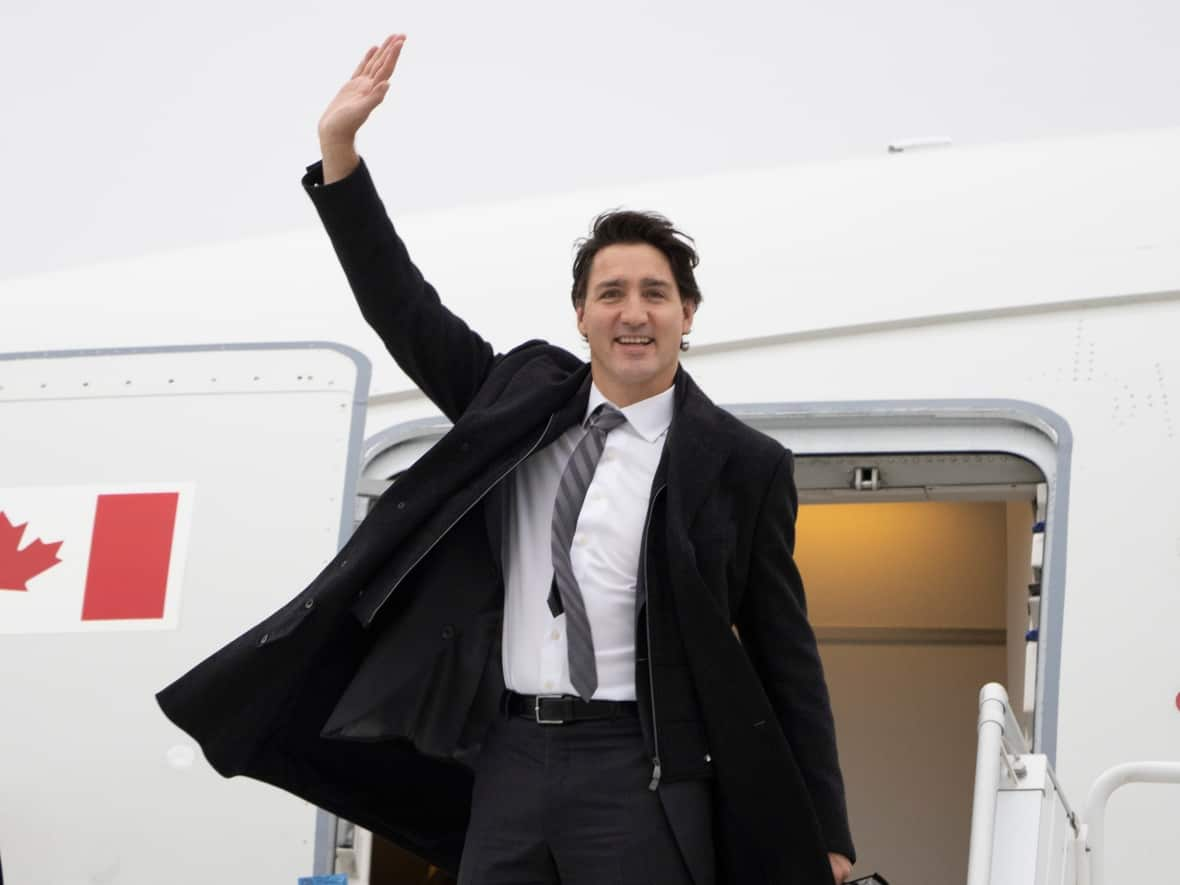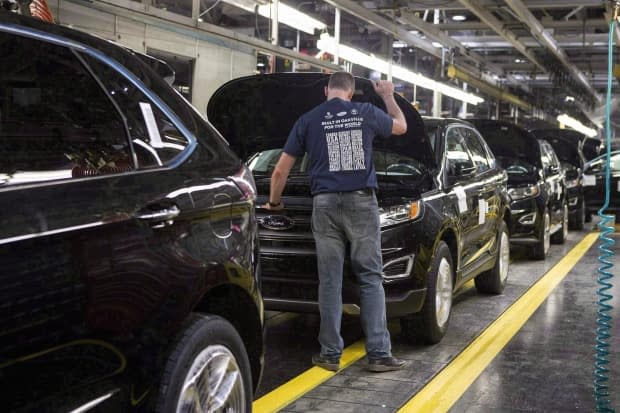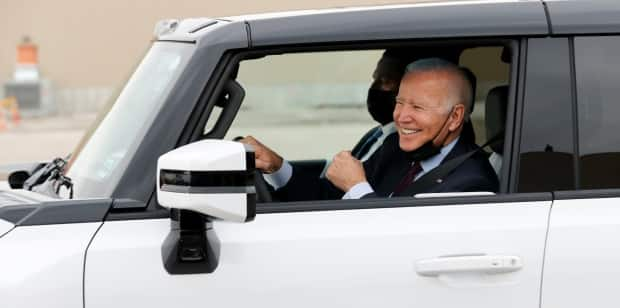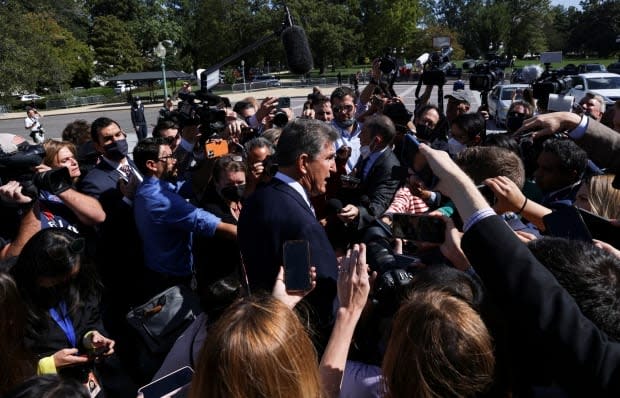Trudeau arrives in U.S. with last-minute warning for Democrats about electric vehicle tax credit

Prime Minister Justin Trudeau arrived in Washington, D.C., Wednesday with a warning about legislation Democratic lawmakers are on the cusp of advancing through Congress.
There are no immediate signs he's changed any minds. From the White House to the Senate, politicians who back the policy still seem determined to push ahead.
The prime minister landed for a two-day visit while American legislators complete a massive budget bill that includes an electric vehicle tax credit bitterly opposed by the United States' trading partners.
Trudeau raised those concerns during a Capitol Hill meeting today with the leaders of the House of Representatives and the Senate, and will again on Thursday with President Joe Biden.
He mentioned them in his first public stop in the U.S. capital, at a public forum at the Wilson Center think-tank.

The prime minister argued that the tax credit plan flies in the face of decades of continental integration of the auto sector, from the signing of the 1965 Auto Pact to the new North American trade deal.
"We are a little bit concerned about the zero-emission vehicle mandates, or rebates," Trudeau said at the event, moderated by former U.S. ambassador to Canada David Jacobson.
"[That] could have a real negative impact."
U.S. Senate could pass bill by end of year
Trudeau's message to Americans is that the credit, as it's currently designed, would do more than hurt the countries that export autos to the U.S. — that it would also damage continental supply chains and penalize U.S. workers whose products are exported for assembly.
But he's in a race against time.
Democrats hope to pass a version of the bill through the House of Representatives any day now. The bill faces a bumpier ride in the Senate, where lawmakers hope to complete its adoption this year.
The bill includes a credit worth $12,500 toward the purchase of electric vehicles. It's designed to steer electric vehicle production to Michigan and to its unionized plants.
More than a third of that rebate is applicable only to purchases of vehicles assembled in the U.S. by union workers, and in 2027 the entire credit will apply only to those vehicles.
Trudeau said this could hurt American companies exporting to non-U.S. plants, while undermining the competitiveness of the entire North American auto sector.

"Doing this together is good for all of us," Trudeau said.
Recent strains on supply chains around the world made it clear that countries need reliable allies, he said.
He used the example of critical minerals and the role Canadian mines could play in reducing the United States' dependence on China for key components for electric vehicles.
"At a time when supply chains are disrupted around the world, when people are rethinking, 'Where are we getting things from? And what happens if there are breakdowns, either political or geographic or climate-related? How do we ensure resilient supply chains?'" Trudeau said. "Well, I go back to the critical minerals example.
"The U.S. could do worse than rely on its closest friend, its oldest friend, its most reliable friend."
WATCH | Why Biden's EV tax incentive is irking Canada:
Democrats not backing down
There's been no sign to date of U.S. Democrats relenting on their plan.
In fact, even as Trudeau was landing in Washington, President Biden was off to Detroit to promote his legislative agenda at one of the Michigan electric vehicle plants that stands to benefit.
Biden said the goal of the planned incentive is to encourage the purchase of "American-made, union-made, clean vehicles." He cast the legislation as part of a broader effort to reinvigorate U.S. manufacturing in the face of competition with China.
Appearing at the event with Biden were some congressional sponsors of the vehicle-credit plan. One such backer, Michigan Sen. Debbie Stabenow, ridiculed foreign auto-makers for trying to stop the plan, singling out Toyota.

"It takes a lot of nerve," she said, arguing that Japan makes it hard to import U.S. cars and pointing out the hypocrisy of Toyota using union labour in Japan but not in the U.S.
"Bring our jobs home!"
Canada wasn't mentioned during the event. However, aboard Air Force One on the way to Michigan, a spokesperson for Biden was asked about the objections coming from Canada and Mexico and pushed back.
White House deputy press secretary Chris Meagher said there's a long history of countries using tax credits to influence consumer choices. He said Biden campaigned on a promise to help unions and restore the middle class.
He also said that — contrary to indications from the White House last week — there will be no joint news conference for the three North American leaders after their summit Thursday.
Manchin again holds key swing vote
The only indication so far that the plan could face resistance is coming from the Senate — where Sen. Joe Manchin, a Democrat, has criticized it. Manchin is considered a critical swing vote.

But Manchin hasn't been clear about what he wants instead.
Negotiations between Manchin, Senate leadership, the White House and the House of Representatives over the coming weeks will determine the fate of this bill — the most important of Biden's presidency to date.
Deputy Prime Minister Chrystia Freeland was among the ministers in Washington with Trudeau. She said they made it clear to U.S. lawmakers how seriously they take this issue.
In fact, Freeland told reporters, this irritant could become a dominant issue in Canada-U.S. relations if it's not resolved. She said she's positive the plan violates the new North American trade pact — which suggests the possibility of forthcoming trade lawsuits.
Trudeau reiterates call for global carbon tax
At the Wilson Center event, Trudeau also repeated his call for a global carbon price.
He said it's unfair that countries like Canada price carbon and produce low-carbon-footprint aluminum while competing against countries that produce such products dirtier and more cheaply.
The U.S. doesn't have a national carbon price. That electric vehicle credit is, so far, its most aggressive attempt at climate action with a chance of being enacted by Congress.
On that issue, Trudeau arrived in Washington with the support of an on-again, off-again political rival: Ontario Premier Doug Ford.
Ford said the two countries' auto sectors are joined at the hip. He said he expressed that solidarity to Trudeau during a first ministers' call Tuesday night.
"I told the prime minister last night, and all the premiers feel the same way, 'We will stand shoulder to shoulder as Team Canada when he goes down to the U.S.," Ford told a news conference."We all told him — I told him personally — 'We'll have your back. We'll do whatever you need to have done to make sure that we be excluded from this.' Because it's absolutely ridiculous."


